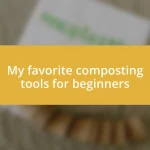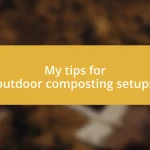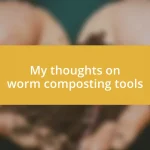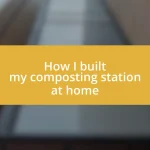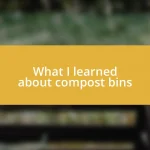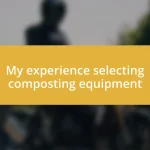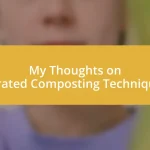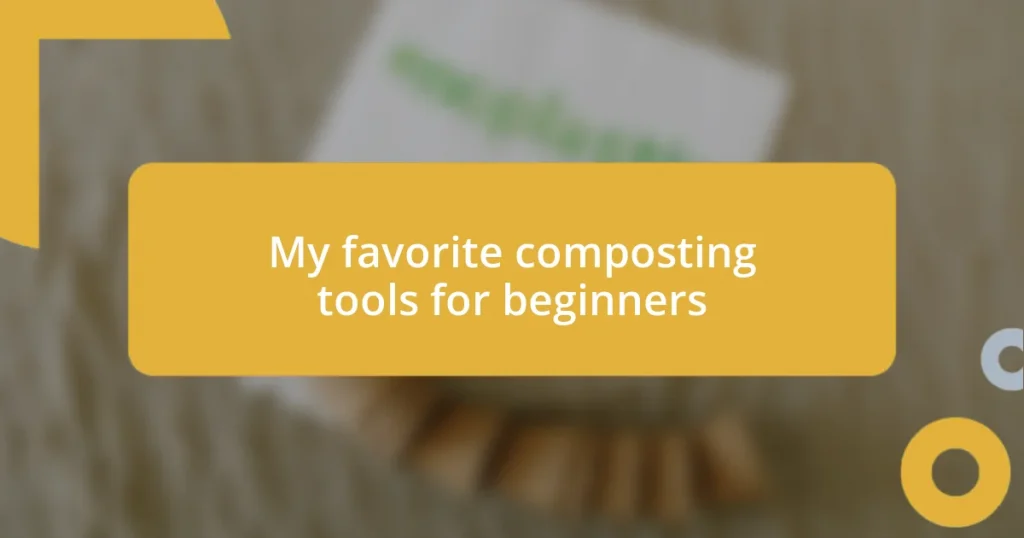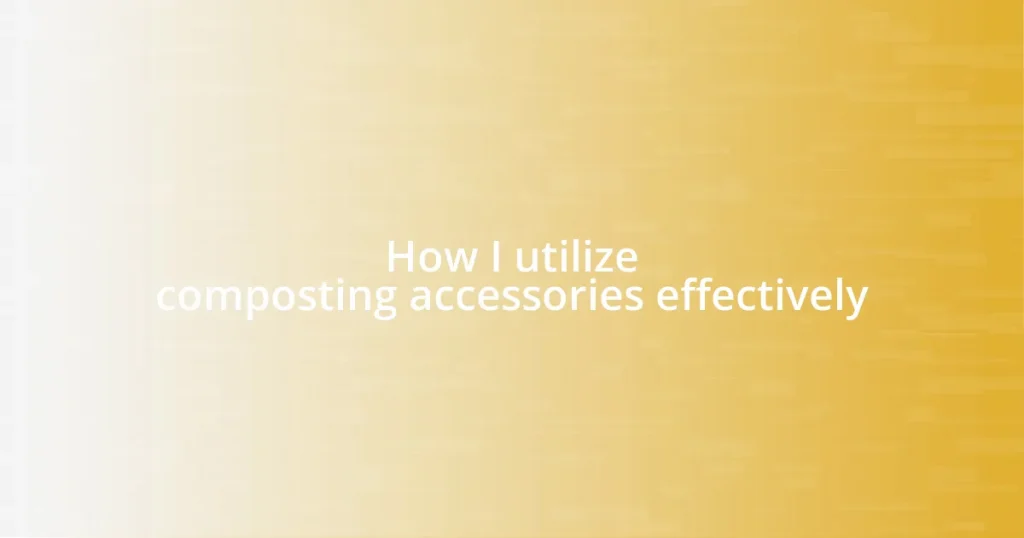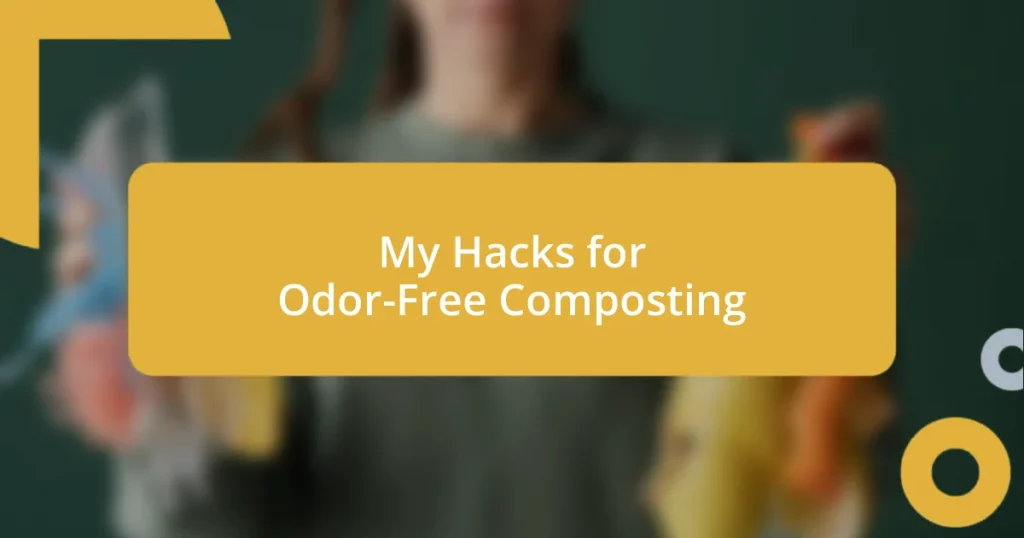Key takeaways:
- Essential composting tools include a sturdy compost bin, a pitchfork or compost aerator, gloves, and a compost thermometer to enhance the composting experience.
- Choosing the right type of compost bin (tumbler, worm, plastic, or wooden pallet) significantly improves composting efficiency and minimizes issues like odor and pests.
- Regular maintenance of composting tools through cleaning, proper storage, and inspections can prolong their lifespan and ensure a more enjoyable composting process.

Essential composting tools overview
When I first ventured into composting, the array of tools seemed overwhelming, but there are a few essentials you definitely shouldn’t skip. A sturdy compost bin is invaluable; it keeps everything tidy and speeds up decomposition. I remember wrestling with a makeshift setup when I started, and I quickly learned that having a reliable bin made all the difference in my composting journey.
A pitchfork or compost aerator is another must-have. I can’t tell you how satisfying it is to turn the compost and watch as the materials transform. It’s not just about mixing; it’s an interactive experience where you see your kitchen scraps turning into black gold. Have you ever thought about how a simple tool can connect you so deeply with nature’s processes?
Lastly, a good pair of gloves and a compost thermometer can enhance your composting experience. I’ll admit, initially, I scrapped gloves thinking they’d slow me down, but they kept my hands clean and protected while I dug into the layers. By monitoring the temperature, not only can you speed up composting, but you truly engage with the compost’s inner workings, making the whole journey feel a bit like alchemy.

Best compost bins for beginners
When choosing a compost bin, I’ve found that simplicity often wins. My first bin was a basic, open-top design, and while it was easy to access, I quickly noticed some challenges with odor and pests. Eventually, I upgraded to a closed compost bin, and it was like flipping a switch — no more unwanted visitors! Finding the right fit for your composting needs can really enhance your experience.
Here are some of the best compost bins for beginners I recommend:
- Tumbler Bins: These are fantastic for quick composting. Just spin, and you’re mixing the materials effortlessly. I was amazed at how much faster my compost was ready!
- Worm Bins: If you’re tight on space, this option is brilliant. I’m always in awe of how much my red wigglers can munch through kitchen scraps while creating nutrient-rich vermicompost.
- Plastic Bins: Affordable and interchangeable, they can suit various spaces. I valued how lightweight they were when I had to move mine around in the yard.
- Wooden Pallet Bins: For a rustic touch, pallets make wonderful bins. I built one from recycled pallets, and not only did it look charming, but it also provided great airflow for decomposition.
Selecting the right compost bin fosters a more enjoyable and efficient composting journey. The moment I noticed my kitchen scraps breaking down into rich, dark soil was deeply satisfying. It’s like witnessing nature’s magic unfold right in my own backyard!

Recommended compost tumblers for efficiency
I’ve found that compost tumblers are truly the unsung heroes of efficient composting. With their enclosed structure and rotating design, they keep the materials well-mixed, which speeds up the decomposition process significantly. I still remember the sheer joy of hearing that satisfying whir as I spun my tumbler, watching the layers of green and brown mix together like a velvety cake batter. It’s funny how something so simple can ignite such enthusiasm!
Among the various options, two tumblers stand out in my experience: the dual-chamber tumblers and the rolling composters. Dual-chamber models allow you to have one side composting while the other side finishes up. I found that it provided a steady supply of finished compost, and the ability to manage temps and moisture was a game changer. My rolling composter, on the other hand, introduced a whole new level of ease; it was perfect for moving around the garden, which meant I could grab scraps from the kitchen and roll it right to my garden bed. Have you ever had a moment where you realize you’ve just made the composting process so much smoother? It feels liberating!
To help you choose the best option for your own composting journey, here’s a comparison of some recommended compost tumblers:
| Compost Tumbler | Key Features |
|---|---|
| Dual-Chamber Tumbler | Allows for continuous composting, better mixing, and temperature control |
| Rolling Composter | Easy to move, designed for compact spaces, quick access to finished compost |
| Small Tumbler | Perfect for apartments; lightweight and portable, ideal for small kitchens |
| Large Capacity Tumbler | Holds a significant amount of waste, great for larger households |

Ideal hand tools for composting
When it comes to hand tools for composting, a trusty garden fork is essential. I find it incredibly satisfying to turn my compost pile with it, allowing air to circulate and helping to speed up the decomposition process. There’s something about the rhythm of the fork digging into the earthy blend of kitchen scraps and yard waste that feels both therapeutic and productive. Have you ever noticed how a well-aerated compost pile smells fresh and lively? That’s no accident!
Another must-have in my composting toolkit is a good pair of gloves. They not only protect my hands from the sometimes gritty textures of compost, but they also allow me to work with confidence. I remember the first time I dove in without gloves — it was a messy affair! Once I switched to a sturdy pair, I felt more at ease sifting through materials and even worm wrangling. It’s all about making the experience comfortable and enjoyable, right?
Lastly, I can’t stress enough how invaluable a hand trowel is for adding materials and adjusting layers in my bin. When I’m layering my greens and browns, a trowel makes it super easy to position everything just right. I love how it allows me to dig in and get creative with my compost mix. Plus, if you ever find yourself needing to grab some compost for your garden, having a trowel handy makes that process smooth. Who knew that such simple tools could elevate my composting game?

Compost thermometers for effectiveness
Compost thermometers are like secret weapons in my composting arsenal. I remember the first time I used one; it was a game changer! By measuring the internal temperature of my compost pile, I could ensure it was hot enough for effective decomposition. It was such a relief to finally know when the microbes were doing their job and when I needed to add more greens or balance moisture levels.
What I love about these thermometers is that they take the guesswork out of the equation. There’s nothing quite like seeing that thermometer needle climb above 130°F, signaling a thriving environment for microbes to break down organic matter. It’s satisfying to know I’m creating the best conditions for my compost to flourish! Have you ever wondered how your pile compares? Using a thermometer brings confidence that you’re actively managing your composting process.
I also appreciate the simplicity of using a compost thermometer. It requires very little effort, yet it adds so much value. When I’m out in the garden, taking a moment to check the temperature often unfolds into a mini-celebration. I think about how simple tools can lead to thriving compost! Feeling that warmth radiate as I pull out the thermometer reminds me that great results come from caring for our compost with attention and knowledge. It’s this connection with my composting that fuels my passion.

Top add-ins for compost quality
When it comes to add-ins for compost quality, one of my favorites is coffee grounds. Not only do they add nitrogen, which is crucial for a balanced compost mix, but there’s something so energizing about knowing I’m repurposing what would otherwise end up in the trash. I still remember the first time I added a bucket of grounds from my favorite café; it felt like I was giving my compost a boost of caffeine! Have you ever thought about how these seemingly small contributions can make such a big difference?
Another fantastic add-in is eggshells. I’m always amazed at how much calcium they add to the mix. When I first started composting, I used to toss them into the pile whole, but then I discovered that crushing them makes them break down faster. It’s a simple step, yet it transforms the texture of my compost. Just think about it: how often do we overlook our kitchen scraps, not realizing the treasure they hold for our gardens?
Lastly, I can’t overlook the magic of leaves. Whenever autumn rolls around, I make a point to gather as many of them as I can. Those crunchy, colorful leaves not only add structure to my compost but also help aerate it. The sound of stepping on them brings me back to my childhood, playing outside, and those memories just make the whole composting experience more joyful. Have you tried using leaves to connect with nature while improving your compost? It’s a beautiful cycle of giving back to the earth!

Tips for maintaining compost tools
Maintaining your compost tools is essential to ensure they last and perform effectively. I remember the first time I neglected to clean my compost fork – it rusted quickly, and I regretted not taking a few moments to wipe it down. A quick rinse and some gentle scrubbing can prevent buildup of dirt and debris, prolonging the life of your tools and making your composting experience more enjoyable. Have you experienced the frustration of struggling with a dirty tool?
Storing tools properly can also make a huge difference. I used to toss my composting gear haphazardly in the shed, but I quickly learned that keeping them organized leads to easier access and less wear and tear. I now hang my tools on a dedicated rack, which has not only saved me time but also prevents accidental damage. Does your storage setup make you eager to engage with your compost?
Lastly, regular inspections can help catch any issues before they become problems. During one of my routine checks, I discovered a crack in my compost bin that could have led to a messy situation. Taking a few minutes every couple of months to ensure everything is in good shape has made my composting journey smoother. Have you taken a moment to check on your tools lately? You’d be surprised how a little effort can yield big rewards!

